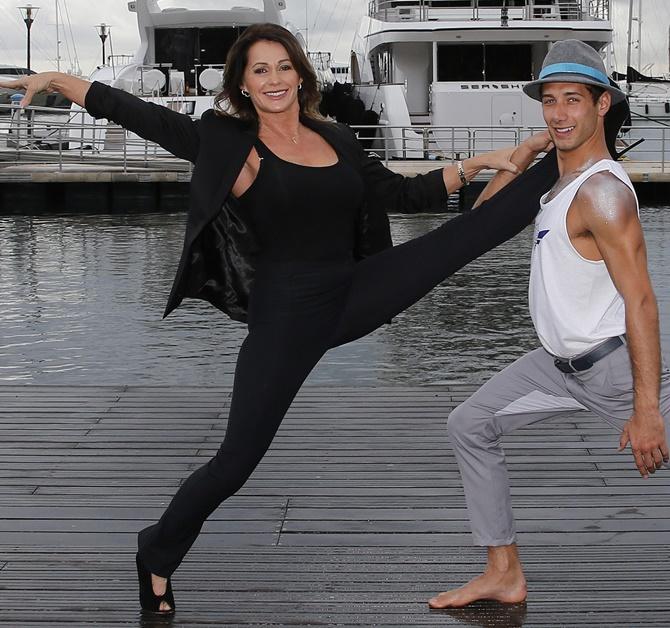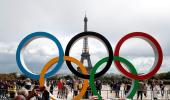
Every four years, the world holds its breath, as the Olympics bring the world together.
Athletes, trained to peak perfection, compete for glory. In this intense competition, legends are born.
But not all legends are created equal. Some leave an indelible mark, their names forever etched in the annals of Olympic history. These are the chosen few, who shatter records, and whose feats become the stuff of legend.
Is it Michael Phelps, the swimming legend with a record-breaking 28 medals? Or Larisa Latynina, the gymnastics icon who held the medal record for years?
Maybe it's Jesse Owens, who defied adversity with his gold medals at the 1936 Berlin Olympics. Or perhaps it's Usain Bolt, the sprinting superstar who dominated his sport.
The debate for 'greatest' is exciting. It's about amazing athletes achieving incredible things.
At the Paris Olympics, new heroes will emerge. But before then, let's celebrate the Olympians who are already legends!
Michael Phelps (swimming)

Michael Phelps isn't just the most decorated Olympian, he's in a league of his own.
With a staggering 23 gold medals, Phelps has more than doubled the achievement of his closest competitor. It's a testament to his sheer brilliance and unwavering dedication.
Phelps' journey began at 15, where he dipped his toes into the Olympic waters at the 2000 Sydney Games. While a podium finish eluded him then, it was a mere foreshadowing of the legendary career that was to unfold.
From Athens 2004 onwards, Phelps transformed into an unstoppable force. He shattered records like they were mere ripples in the pool, dominating butterfly, freestyle, and medley events. The 2008 Beijing Olympics cemented his legacy where, he surpassed compatriot Mark Spitz's 1972 record by clinching a phenomenal eight gold medals in a single Games.
Phelps didn't just break Larisa Latynina's record of 18 career medals at the 2012 London Olympics, he obliterated it.
Even after announcing retirement, Phelps returned for a victory lap at the 2016 Rio Olympics, bagging five more golds and proving that age was just a number.
His 28 total medals, including three silver and two bronze, stand as an insurmountable peak in Olympic history.
Michael Phelps doesn't just hold the record for most Olympic medals; he embodies the very spirit of Olympic excellence. His dominance is unparalleled, his achievements unprecedented.
He is, by far, the greatest Olympian to ever grace the Games.
Larisa Latynina (gymnastics)

While Simone Biles may be a dominant force in gymnastics today, Larisa Latynina holds an unmatched legacy on the Olympic stage.
Latynina, representing the then Soviet Union, amassed a staggering 18 Olympic medals -- the most by any female athlete until Michael Phelps surpassed her in 2012.
Her collection includes a remarkable nine gold medals, won across three consecutive Olympics (1956, 1960, 1964).
Latynina's reign extended beyond gold, with an additional five silver and four bronze medals across various disciplines.
This remarkable consistency on the biggest stage makes her a strong contender for the title of 'greatest gymnast of all time'.
Latynina's brilliance wasn't limited to just one event. She dominated the floor exercise, claiming three consecutive gold medals, showcasing her exceptional athleticism and artistry. Her versatility extended to beam, uneven bars, and other apparatus, securing her a place on the podium across various disciplines.
While the sport has evolved significantly since Latynina's era, her achievements remain awe-inspiring. With her unmatched Olympic medal haul and unmatched longevity, Larisa Latynina remains a true legend and a defining figure in gymnastics history.
Usain Bolt (track and field)

Usain Bolt wasn't just a champion sprinter, he was a showman. His dominance was undeniable, but it was his electrifying personality that truly captured the world's attention.
Bolt's legacy is built on eight golden thunderbolts -- three consecutive victories each in the 100m and 200m sprints at the Beijing (2008), London (2012), and Rio (2016) Olympics.
He stands alone in this feat, solidifying his position as the undisputed king of speed. His dominance extended to the 4x100m relay, where he secured three more gold medals.
Beyond his Olympic haul, Bolt holds the world records in both the 100m and 200m, times that appear untouchable for the foreseeable future.
But Bolt's impact goes beyond statistics. His electrifying personality, with his signature lightning bolt pose, captivated the track. He became a global icon, inspiring millions and making the Olympics a more vibrant spectacle.
Though one of his relay gold medals was later rescinded due to a teammate's doping violation, it doesn't diminish the brilliance of Usain Bolt. He remains an Olympic legend, a symbol of pure speed and an athlete whose charisma ensured the Games crackled with his electric energy.
Nadia Comaneci (gymnastics)

Nadia Comaneci's name is synonymous with gymnastics. But it's not just her medal count (five gold, three silver, one bronze) that secures her legendary status. It's the revolutionary moment at the 1976 Montreal Olympics, where 14-year-old Comaneci shattered the very notion of what was possible.
Her flawless routine on the uneven bars defied expectations so thoroughly that the scoreboard, not designed for a perfect 10.0, simply displayed a 1.00.
This wasn't just a technical glitch; it was a testament to the groundbreaking nature of her performance. For the first time in the 72-year history of Olympic gymnastics (women's artistic gymnastics debuted in 1928), a gymnast had achieved absolute perfection.
Comaneci didn't stop there. She went on to score six more perfect 10s at the Montreal Games, securing three gold medals (all-around, uneven bars, balance beam). This wasn't just a personal triumph; it ushered in a new era of gymnastics, pushing the boundaries of difficulty and artistry.
Even today, Nadia Comaneci remains the face of gymnastics. Her impact goes beyond the scores. She inspired generations of young athletes to strive for excellence, to push the limits of human potential.
The perfect 10, once a myth, became a standard, a testament to the young Romanian who dared to redefine perfection.
Carl Lewis (track and field)

Carl Lewis isn't just an Olympic legend; he's a symbol of dominance.
With a staggering nine Olympic gold medals, he stands head and shoulders above most athletes. Sports Illustrated magazine rightfully dubbed him 'Olympian of the Century' in 2022.
Lewis' reign began at the 1984 Los Angeles Games. He wasn't just participating; he was putting on a masterclass. He swept the 100m, 200m, long jump, and 4x100m relay, even setting world records in the 100m and relay. This feat mirrored the achievements of his idol, Jesse Owens, solidifying Lewis' place in track and field history.
His brilliance extended beyond 1984. Lewis went on to secure five more gold medals across Seoul, Barcelona, and Atlanta, remarkably defending his long jump title at each Olympics. This longevity and consistency are testaments to his dedication and unwavering talent.
Lewis' legacy isn't just about medals. He redefined what it meant to be an athlete. His versatility across sprinting and jumping showcased his exceptional physical prowess. His longevity pushed the boundaries of what athletes could achieve over an entire decade.
With nine gold medals and his undeniable impact on the sport, Carl Lewis remains a towering figure in Olympic history. He is, without a doubt, an icon whose presence will continue to inspire future generations.
Mark Spitz (swimming)

Long before Michael Phelps became synonymous with Olympic swimming dominance, Mark Spitz reigned supreme in the pool. Nicknamed 'Mark the Shark' for his sleek efficiency and predatory instincts, Spitz carved his name into Olympic history with an unmatched performance at the 1972 Munich Games.
Munich 1972 was Spitz's defining moment. He wasn't just winning races; he was owning them. In a feat that would stand for an incredible 36 years, Spitz captured a gold medal and set a world record in all seven events he entered.
From the butterfly to the freestyle and the medley relay, no distance or stroke was a challenge for Spitz. This magnificent sweep added to his two gold medals from Mexico City 1968, bringing his total to a then-astonishing nine.
Spitz's dominance wasn't just about winning; it was about the sheer artistry and power he brought to every race. He was a master of technique, gliding through the water with unmatched speed and grace.
For decades, he held the record for most gold medals at a single Olympics, a testament to his unparalleled reign in the pool.
While Michael Phelps eventually surpassed his medal count, Spitz's legacy remains undimmed. He was the pioneer, the swimmer who pushed the boundaries of what was possible and inspired a generation of aquatic athletes.
Mark Spitz was, without a doubt, the undisputed king of the pool before Phelps made a splash.
Jesse Owens (track and field)

Jesse Owens' story is more than just Olympic glory; it's a testament to the power of human spirit in the face of adversity.
While his Olympic career spanned only one Games, his achievements at the 1936 Berlin Olympics solidified his place as a legend.
Owens wasn't competing against just other athletes; he was competing against a backdrop of racial prejudice. The Berlin Games were a propaganda platform for Adolf Hitler's Nazi regime, and Owens, an African-American, defied expectations by securing four gold medals -- in the 100m, 200m, long jump, and 4x100m relay -- some even setting world records.
His victories shattered Hitler's myth of Aryan supremacy and became a powerful symbol of hope for oppressed people around the world.
While some may argue that his medal count doesn't stack up to modern Olympic greats, Owens' impact goes far beyond the podium.
He stood as a beacon of defiance, proving that talent and determination could triumph over prejudice on the world's biggest stage. His legacy continues to inspire generations of athletes and activists to fight for what they believe in.
Paavo Nurmi (track and field)

Neeraj Chopra's triumphs at the Paavo Nurmi Games (gold in 2024, silver in 2022) have thrust the Finnish competition into the spotlight for Indian fans. The event, previously unknown to many, is now recognised as a breeding ground for champions. But the Games hold a deeper significance. They are named after Paavo Nurmi, the legendary Finnish runner nicknamed 'The Flying Finn'.
Nurmi dominated the sport, securing a staggering nine gold medals and 12 total across three Olympics. His 1924 Paris Games stand out, where he became the first athlete to win five golds in a single event -- a feat unmatched for decades.
Nurmi's dominance reached new heights at the 1924 Games, where he defied expectations by winning both the 1500m and 5000m gold medals within a staggering 90 minutes.
Nurmi's impact goes beyond medals; he revolutionised training methods and embodied the relentless pursuit of excellence.
Birgit Fischer (kayaking)

While medal count is a significant measure of Olympic success, longevity and dominance within a specific sport paint an even more compelling picture. Birgit Fischer, the German kayaking legend, embodies this perfectly.
Fischer boasts an unparalleled career spanning six Olympic Games (1980, 1988, 1992, 1996, 2000, 2004) -- missing only the 1984 Games due to the GDR boycott. Her dedication and talent are further cemented by her impressive medal haul: eight gold and four silver medals.
Fischer's dominance wasn't limited to just one category. She secured gold medals in the single kayak, double kayak, and even the four-person kayak, showcasing her versatility across different disciplines.
This adaptability, coupled with her unwavering focus, resulted in a record-breaking achievement -- becoming the only female Olympian to win medals a staggering 20 years apart.
Birgit Fischer's legacy transcends medals. She is an inspiration for athletes of all ages, proving that dedication and persistence can rewrite records and defy limitations.
Her reign as the 'Queen of Canoe Kayaking' remains unchallenged, securing her a well-deserved spot among the greatest Olympians of all time.
Isabell Werth (equestrian)

Isabell Werth isn't just a decorated equestrian; she's a symbol of unwavering excellence in the demanding world of dressage.
Her Olympic career is a masterclass in consistency and mastery. From 1992 to 2020, an unparalleled six Olympics, Werth secured at least one gold medal at every single Games. This incredible feat speaks volumes about her ability to maintain peak performance over nearly three decades.
The sheer number of medals -- seven gold and five silver -- only begins to tell the story. Werth's dominance wasn't limited to single victories; she built a dynasty. Her partnership with various horses throughout her career showcased her exceptional ability to train and connect with these magnificent animals.
Werth's influence extends far beyond the medals. She has redefined what it means to be a dressage rider, pushing the boundaries of artistry and precision. Her dedication and talent have inspired a generation of aspiring equestrians, solidifying her place as one of the greatest Olympians of all time.












 © 2025
© 2025